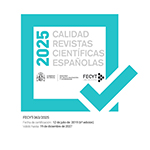Focus and Scope
Investigaciones Feministas (ISSN-e 2171-6080) is an international peer-reviewed, biannual journal, that publishes papers aiming to promote and enrich the scientific knowledge in the field of Women’s, Feminist and Gender Studies. It is a multidisciplinary periodical which publishes works from different research fields.
Publication Frequency
Biannual
Interoperability protocols
Investigaciones Feministas provides an interface OAI-PMH (Open Archives Initiative – Protocol for Metadata Harvesting) that enables interoperability between different platforms and repositories through the exchange of metadata.
Protocol: OAI-PMH Version 2.0
Metadata formats: Dublin Core Metadata; MARC; MARC21; RFC1807
URL for harvesters: https://revistas.ucm.es/index.php/INFE/oai
General information
It is not published in paper form.
Anti-plagiarism Policy
Investigaciones Feministas guarantees the originality of all the submitted manuscripts through the use of anti-plagiarism software provided by Ediciones Complutense. This policy ensures the appropriate originality standards as well as the detection of coincidences and similarities between texts sent for publication and those published previously in other sources. In the event of plagiarism, the manuscript will be rejected.
Code of good practices concerning gender
This journal is pledged to defend gender equality, to give visibility to the scientific works of female researchers and promote the use of inclusive language in scientific publications.
Specifically, this is carried out through the following actions:
- Maintaining gender parity in the journal’s Directorate, Editorial Secretariat, Editorial Board and Advisory Board.
- Having a minimum percentage of 40% of female reviewers.
- Incorporating in the journal’s Editorial Policy a series of specific recommendations in favor of using inclusive language in scientific publications. Inclusive language acknowledges diversity, is respectful towards people, considers differences and promotes equal opportunities for everybody. Articles should not include suppositions about the beliefs of readers and should avoid statements concerning superiority relative to race, sex, culture or any other similar aspect. A language free of bias, using terms that avoid stereotypes, should be used while writing an article. In that regard, authors are encouraged to read any guideline about bias-free language, for instance, APA's online guideline.
- Requiring authors to inform whether the research’s data take sex and/or gender into account or not, with the intention of identifying any differences that may result from it.
- Use of complete names of authors in the works published by the journal.










